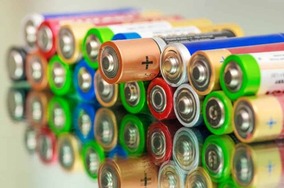 by Amelia Halverson, Ottawa, Canada Did you know that according to the Environmental Protection Agency (EPA), each year Americans throw away more than three billion batteries. That's about 180,000 tons of batteries. More than 86,000 tons of these are single use alkaline batteries. Imagine, placed end to end these dead alkaline batteries alone would circle the world at least six times. Sadly, this means that a lot of used batteries are currently occupying landfill space or being burnt away, damaging the environment. 1. Trashed batteries contribute to water and air pollution, which is detrimental to the environment Each battery contains hazardous, toxic and corrosive materials such as mercury, cadmium, lithium, nickel, cobalt, and lead. If tossed into the trash, they end up in landfills where they decay and leak, their hazardous chemicals soaking into the soil and contaminating groundwater and surface water, the two fundamental elements for life to exist. To add onto this, lithium batteries can cause horrible landfill fires that can smolder for many years. Subsequently, the toxic chemicals released into the air negatively affect our breathing and contribute to global warming. That’s one of the reasons why batteries should not be discarded into regular trash or recycling bins. 2. Old batteries negatively affect human health Exposing the environment to harmful materials found in batteries (like lead and strong corrosive acid) can cause burns and dangers to our eyes and skin. When toxic metals like nickel and cadmium (also found in batteries) interact with our air and water, humans risk developing lung damage and cancerous disabilities. Lead that can be found in batteries is linked to severe medical issues like developmental disabilities, neurological damage and congenital disabilities. 3. Materials recycled from batteries can be used to make new products Many types of materials can be recycled from used batteries. Below are some examples. Reusable Materials In Batteries Single-use alkaline batteries Zinc and manganese recycled from spent batteries can be used to make a micronutrient supplement for plant fertilizers or feed into making steel, sunscreen, and concrete aggregate (see the video below) Lithium primary batteries Can recycle into new products such as silverware, stainless steel, golf clubs and new batteries Nickel rechargeable batteries Can recycle into silverware, pots and pans, golf clubs and new batteries Lithium rechargeable batteries Can recycle into steel, stainless steel and new batteries Lead batteries Reclaimed lead can be used in making new batteries Given all the above considerations, it is incredibly important to recycle batteries, recycle any hazardous chemicals, and reuse valuable resources, ultimately helping protect our planet earth! Learn more: https://www.epa.gov/environmental-topics https://www.call2recycle.ca https://gsiwaste.com Recycled Batteries Are Used To Grow Delicious Corn | Made By Destruction
Comments are closed.
|
 RSS Feed
RSS Feed
